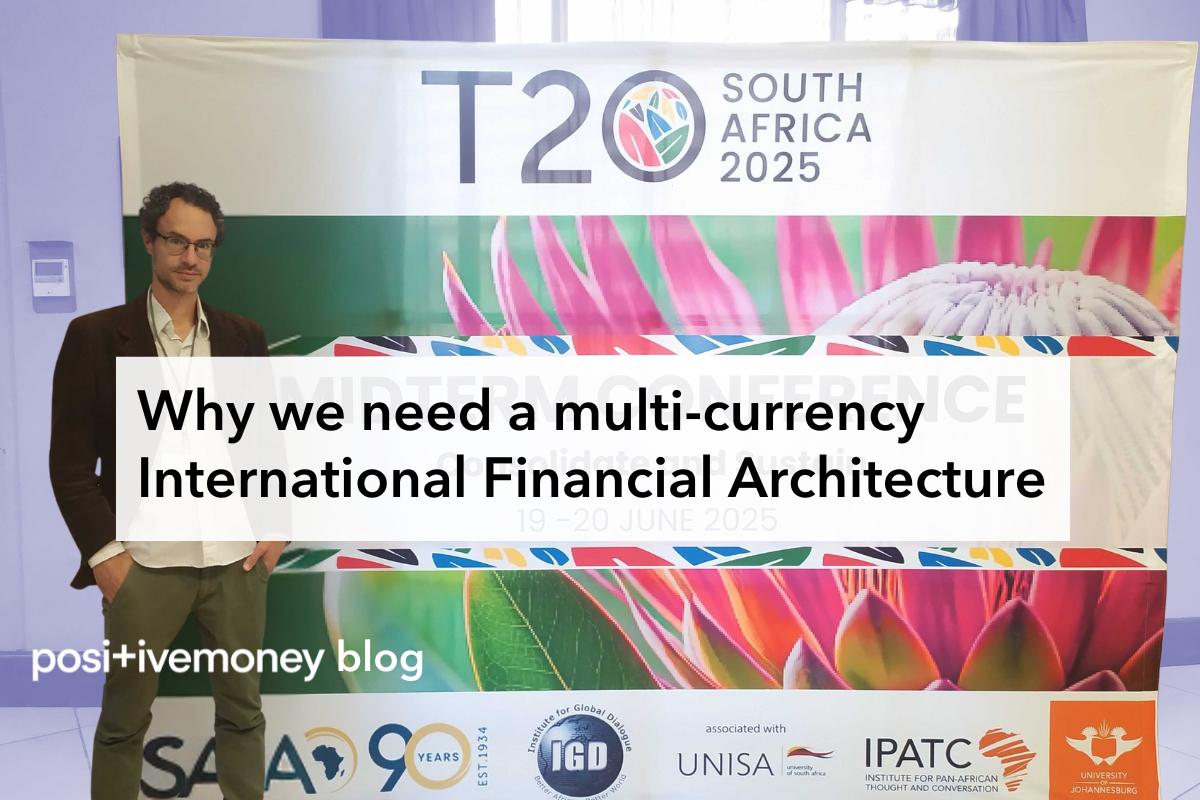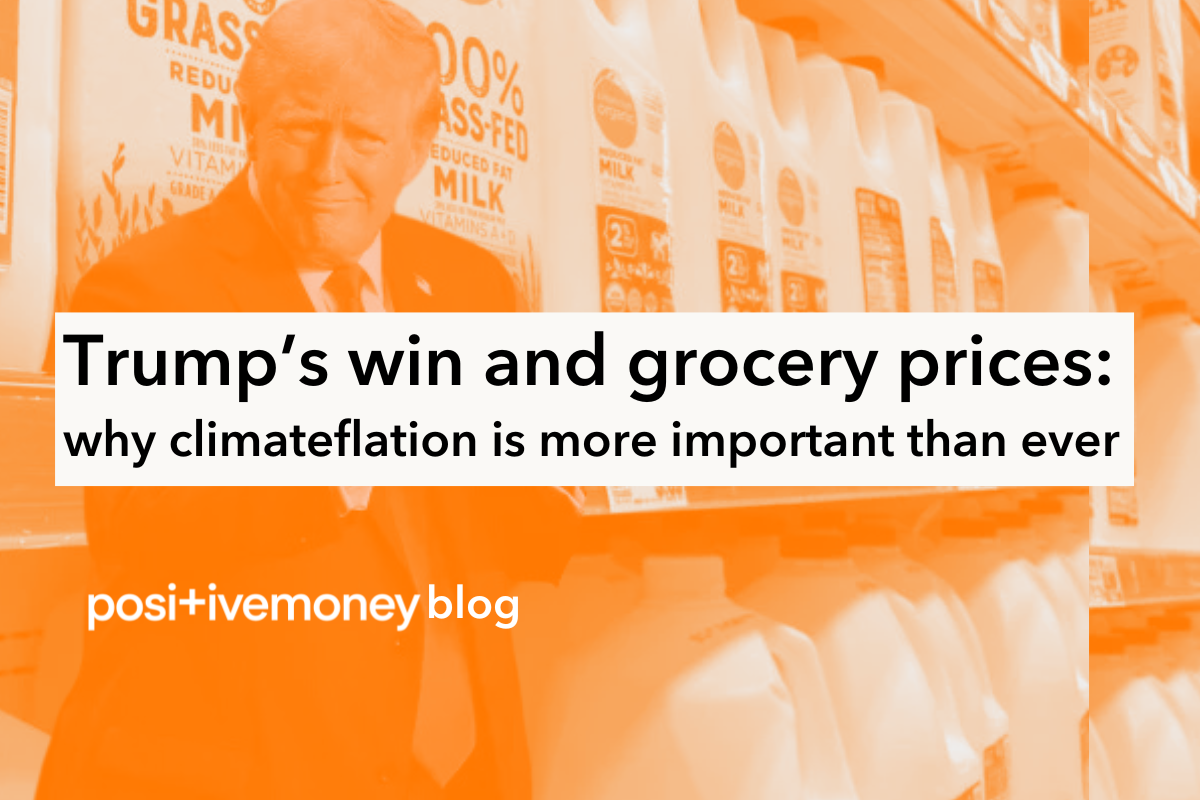
EUUK
3 July 2025
Donald Trump’s win in the US Presidential election is yet more proof of the impact of the cost of living and climate crises, the failure of mainstream economics to address either, and why we need a radical shift to achieve a just and green transition.
As the dust settles on Donald Trump’s second presidential campaign victory, the analysis begins. To answer why more than 4.5 million Americans cast their vote for Trump than Kamala Harris, one factor that cannot be ignored is the price of milk - and all other basic food staples for that matter, with US grocery prices shooting up nearly 25% since before the pandemic.
Climateflation describes how fossil-fuel driven global warming causes more frequent and severe weather events which disrupt the production of basic goods we all rely on, sending prices soaring. For example; droughts in Spain sending olive oil prices skyrocketing. It goes hand-in-hand with Fossilflation, which explains how our dependence on international, private fossil fuels markets leaves us vulnerable to soaring wholesale oil prices; as evidenced by Russia’s invasion of Ukraine and more recent conflicts in the Middle East. For more details, see our paper on Inflation as an Ecological Phenomenon.

While corporate greed is certainly another aspect, a high rate of corporate concentration in food and commodity markets existed before inflation started to soar; it’s the climate crisis that has advanced most in the last few years. Taken together; climateflation and fossilflation paint a very clear, albeit dark, picture of why people’s energy and food bills in the US, and much of the world, have soared in recent years. So why wasn’t this a bigger part of the Presidential campaign?
Soaring prices weren’t entirely absent from Kamala Harris’ campaign. She did suggest a national ban on price gouging, though only in times of crisis. But this suggestion quickly drew negative responses from prominent financial voices at Bloomberg and the Financial Times.
The prevailing view in mainstream economic debates in the lead-up to this election seemed to be that the US economy was doing well. Gross Domestic Product (GDP - a measure of the market value of all goods and services produced in a country), was growing. Unemployment rates were down. The chief economist of Moody’s Analytics, Mark Zandi, told CBS MoneyWatch; “In the 35 years I've been an economist, I've rarely seen an economy performing as well as it is… I'd give it an A+.” But 6 in 10 Americans described the US economy as “fairly” or “very bad”. Why the divide? Firstly, there is a big difference between the headline inflation figure that economists fixate on, and the distribution of inflation between products, in particular more severe price rises on cheaper products, while also considering the fact that people’s memories last much longer than the 12 month period inflation figures account for.
But secondly, this speaks to a greater divide on what pundits versus people mean when we talk about the ‘economy’. Some pointed to ‘vibecession’ theory, a term coined by a former trader Kyla Scalon, to describe the (supposed) disconnect between how an economy is doing, and the public’s negative perception of it. However, to say that people’s experience of the economy being bad is just due to their own bad vibes, is naive at best, and insulting at worst, as economist Isabella Weber has also criticised. When you’re forced to choose between eating and heating, or driven into temporary accommodation because you can no longer afford your rent, vibes are meaningless, be they positive or negative. Ultimately, we need to see a fundamental change in what economists and politicians mean when they talk about the economy, and who it is for. To advance GDP figures (which count pollution and weapons manufacturing as positives) or to improve the living conditions and general wellbeing of people and communities? As we argued in our report on the Tragedy of Growth, it should - and could - be the latter.
This US election result has lessons for the UK. We’re experiencing the same cost of living crisis, our food prices rose 30.6% in 3 years. And it��’s not just food and energy bills, soaring debt, rent, and mortgage payments, have pushed millions more into poverty. The majority of our politicians have overseen a decade and a half of austerity and growing inequality and have chosen to scapegoat this resulting economic deprivation onto the shoulders of migrants, asylum seekers, and benefit claimants - rather than give voters a real alternative message on the economy. This would not only be morally right, but electorally popular. As we saw with the race riots this summer, alongside countering these hateful and false claims, political parties must advance alternatives to develop a more democratic and equal economic model to restore public wellbeing, not promise more of the same neo-liberal policies expecting a different result, as the Democrats did this year.
It’s time for more radical economic analysis to break through, to advance more bold and hopeful ideas. We must challenge the dominant economic and political narrative that endless growth is the answer, that pursuing this above all else will solve our problems. Because when it comes to people’s lived realities and the climate crisis, it’s obvious that it’s only making things worse.
To counter climateflation we must shift away from fossil fuels and towards renewable, home-grown, clean energy production, both in the US, where revisiting the Fossil Free Finance Act introduced in 2023 is essential, and around the globe. In the UK, GB Energy is a great first step in that direction. But we need to be bigger and move faster if we’re to achieve a green transition, and moreover, to make sure that the benefits of doing so are shared with those that need it most, by for instance investing in insulating our homes, boosting public transport, and fixing our broken NHS.
Ultimately, Donald Trump’s win in the 2024 US Presidential election is yet more proof - if any more were needed - of why we must redesign our economic system for social justice and a liveable planet.
__
Sign-up to our mailing list for regular updates or donate to support our work.
